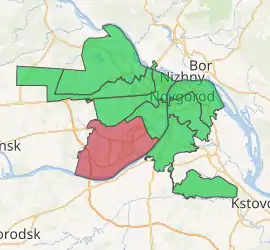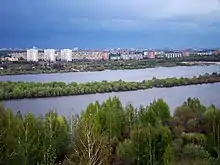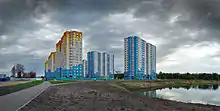Avtozavodsky City District, Nizhny Novgorod
Avtozavodsky City District (Russian: Автозаво́дский райо́н, lit. 'District of the Automobile Plant') or Avtozavod (Russian: Автозавод, lit. 'Autoplant') is one of the eight districts of the city of Nizhny Novgorod, Russia. It is located in the southwest of the Lower City of Nizhny Novgorod, on the low left bank of the Oka River and has a land border with Leninsky City District to the north. It is also connected by the Myza Bridge with Prioksky City District in the Upper City (the right bank of the Oka). Population: 303,054 (2010 Census);[3] 314,494 (2002 Census);[4] 340,378 (1989 Census).[5]
Avtozavodsky District
Автозаводский район | |
|---|---|
Coat of arms | |

Location of Avtozavodsky District on the map of Nizhny Novgorod | |
| Coordinates: 56°14′1.00″N 43°49′18.98″E | |
| Country | Russia |
| Federal subject | Nizhny Novgorod Oblast |
| Established | 1932 |
| Administrative center | Nizhny Novgorod |
| Government | |
| • Type | Local government |
| • Head | Ivan Sogin |
| Area | |
| • Total | 94 km2 (36 sq mi) |
| Administrative structure | |
| • Inhabited localities | Sotsgorod, Strigino Urban-type settlements[2] |
The district's land area is 94 square kilometers (36 sq mi).
History



The name of the district literally means "automotive plant district", as it grew around the production facilities of the Gorky Automobile Plant, which were constructed in this area in 1930–1932. The administrative district was created in 1931 from the land that formerly had been part of Kanavinsky City District and the suburban Dzerzhinsky District. At the time, the district's population was around 30,000.
Transportation
The Strigino International Airport, four stations of the Metro and two stations of the City Rail is located within Avtozavodsky City District.
Notable people
References
- Численность населения Российской Федерации по муниципальным образованиям на 1 января 2017 года
- The count of urban-type settlements may include the work settlements, the resort settlements, the suburban (dacha) settlements, as well as urban-type settlements proper.
- Russian Federal State Statistics Service (2011). "Всероссийская перепись населения 2010 года. Том 1" [2010 All-Russian Population Census, vol. 1]. Всероссийская перепись населения 2010 года [2010 All-Russia Population Census] (in Russian). Federal State Statistics Service.
- Russian Federal State Statistics Service (21 May 2004). "Численность населения России, субъектов Российской Федерации в составе федеральных округов, районов, городских поселений, сельских населённых пунктов – районных центров и сельских населённых пунктов с населением 3 тысячи и более человек" [Population of Russia, Its Federal Districts, Federal Subjects, Districts, Urban Localities, Rural Localities—Administrative Centers, and Rural Localities with Population of Over 3,000] (XLS). Всероссийская перепись населения 2002 года [All-Russia Population Census of 2002] (in Russian).
- "Всесоюзная перепись населения 1989 г. Численность наличного населения союзных и автономных республик, автономных областей и округов, краёв, областей, районов, городских поселений и сёл-райцентров" [All Union Population Census of 1989: Present Population of Union and Autonomous Republics, Autonomous Oblasts and Okrugs, Krais, Oblasts, Districts, Urban Settlements, and Villages Serving as District Administrative Centers]. Всесоюзная перепись населения 1989 года [All-Union Population Census of 1989] (in Russian). Институт демографии Национального исследовательского университета: Высшая школа экономики [Institute of Demography at the National Research University: Higher School of Economics]. 1989 – via Demoscope Weekly.
External links
- Official website of Avtozavodsky City District (in Russian)
- Unofficial website of Avtozavodsky City District (in Russian)